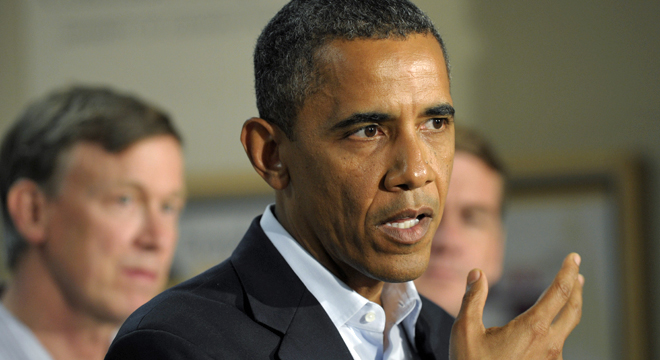If President Obama wins reelection in November, it will be on a platform that promises higher taxes on top earners, tax reform built on top of a significantly higher revenue base and full implementation of his health care and financial reform laws. But if he makes good on any or all of them, it won’t be because Republicans bend to the will of voters and accept his victory as a mandate to govern.
Despite the clear differences between the candidates, Republicans are telegraphing their intent to continue their fight against Obama’s agenda into his second term. Some have brazenly used their own intransigence as an argument for a Mitt Romney presidency: Elect the Republican, or we’ll keep the country ungovernable.
This cuts against a basic to-the-victor-go-the-spoils understanding of democracy. But in a presidential system it’s nothing new and isn’t even all that rare. Politicians and pundits speak and write of electoral mandates as if presidents, like prime ministers of parliaments, were masters of their own policy destinies. But in the U.S. governing mandates are almost always illusory, which means even popular presidents, elected by wide margins, still have to fight like hell to deliver their agendas. And, troublingly, history shows the losers suffer few consequences for subverting voter will.
“Usually talk of mandates is just empty words and false claims,” says James Stimson, a political science professor at University of North Carolina.
Stimson cowrote the book Mandate Politics, which concludes that mandates only manifest after one party sweeps across all levels of government. And even then they can be short-lived if the electoral blowout was widely predicted.
“[A] mandate occurs where there is consensus in the community of politics, i.e., inside the beltway, that the public was sending a message in the pattern of its votes,” Stimson notes. “That is rare, but does occur. We have identified three instances in the period for which we have data, 1964 and the Great Society, 1980 and the Reagan Revolution, and the 1994 congressional landslide. In all these cases the losing side said something rare, ‘the public rejected our message.'”
That’s not a likely outcome this November. Most polls show Obama with a modest advantage nationwide and in key swing states, but they also show Republicans making modest Senate gains — perhaps large enough to take control of the upper chamber. And if Obama wins, the GOP plans to construe those gains as a mixed verdict from voters.
“It is beyond my imagination to think of a November 6 scenario that could satisfy these criteria (although surprise is important precisely because it cannot be predicted),” Stimson added. “Can you imagine a November 7 statement from Mitch McConnell saying, ‘The public has spoken and now it is our duty to work with President Obama to achieve the promised changes.'”
This adds up to a system of government in which big changes are rare, and often occur not because of an effusion of popular support but because of one party’s will to power. After losing the popular vote, President George W. Bush signed major tax cuts and other partisan legislation into law in his first term. In 2005, after a much clearer re-election victory, Bush declared he’d been given a mandate, and yet his key initiative — Social Security privatization — got laughed out of the Capitol.
“Mandates are used for rhetorical purpose but most legislative tacticians discount them,” says former Senate Democratic leader Tom Daschle.
Consider the Romney candidacy. Before he became the vice presidential nominee, Paul Ryan argued to reporters at a breakfast roundtable earlier this year that the Republican presidential nominee would earn a mandate to privatize Medicare if he made the plan central to his appeal to voters. That criterion falls well short of the academic standard for a mandate. But most political observers expect Republicans will use legislative tools to expedite the plan if Romney wins anyhow. That won’t be reflective of a popular mandate for the policy (the particulars of which Romney and Ryan are working hard to obscure from voters) but of a determination to enact it despite public opposition.
In a slideshow presentation shortly after the 2008 election, Stimson argued that despite an overwhelming victory, Obama’s landslide was predictable, largely driven by economic conditions, and he would not enjoy the good will from the opposition that accompanies a real mandate. Ironically, one of the people who helped lead the GOP’s immediate rebellion against the policies Obama had campaigned on (much more explicitly, it should be said, than Romney is campaigning on Medicare privatization) was Paul Ryan himself.
Of course, Obama enacted many of the proposals he’d promised anyhow, but only because he used the brute force of his congressional majorities. Many of his policies were delayed and weakened by Republican filibusters. Others — most notably legislation to address carbon pollution — had to be abandoned.
“Getting something passed because you have enough people in Congress to support it and getting something passed because there’s a sense in the country that people want action are two very different things,” Stimson said.
That doesn’t mean Obama’s second term agenda is hopeless. But it means he likely won’t be able to advance his causes on the strength of the popular vote in November. He’ll have to be both creative and aggressive.
“Crises sometimes create consensus,” Daschle notes. “We face a number of them shortly after the election. Republicans may not want to take ownership of those crises, or at least responsibility for failing to address them.”










